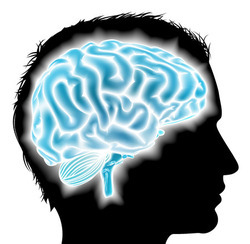Reprinted from https://med.stanford.edu/narcolepsy/faq1.html
(excerpts)
Cause of narcolepsy
Recent studies have shown that narcolepsy with cataplexy is usually caused (>90%) by the lack of two related brain chemicals called "hypocretin-1" and "hypocretin-2". The cause of narcolepsy without cataplexy is still under investigation.
Hypocretins (orexins) were discovered by two groups of researchers almost simultaneously, hence the two names "hypocretins" and "orexins". The first group called them "hypocretin-1" and "hypocretin-2" after discovering that the molecules were found only in the hypothalamus and had some weak resemblance with the gut hormone secretin. Only 10,000-20,000 cells in the entire human brain (out of many billions) secrete these specific hypocretin molecules. The hypothalamus, a region localized deep in the base of the brain, regulates many basic functions such as the release of hormones, blood pressure, sex, food intake regulation and sleep. The subregion of the hypothalamus containing the hypocretin cells was known to be especially important for the regulation of feeding. These molecules were thus first hypothesized to be important in feeding regulation. In fact, the second group that discovered the hypocretin molecules called them "orexin A and orexin B" (from orexis=appetite) and suggested that they stimulated appetite. Orexins and hypocretins are thus interchangeable terms and the scientific community is divided on what is the best name to use.
Recent studies have shown that the hypocretin-containing cells are missing in the brain of narcoleptic patients. The most likely explanation may be that the cells are destroyed by an autoimmune attack.
Hereditary Risk
Most cases of narcolepsy have no other family members affected with narcolepsy and the risk is very small. If you have narcolepsy-cataplexy, the risk for your child to develop narcolepsy-cataplexy is only 1-2%. The risk of developing daytime sleepiness without cataplexy may be slightly higher (4%).
Different Kind of Stimulant
